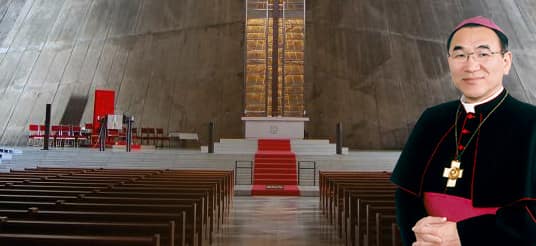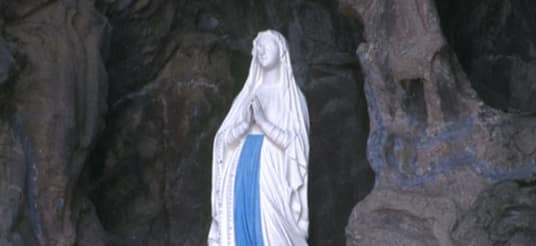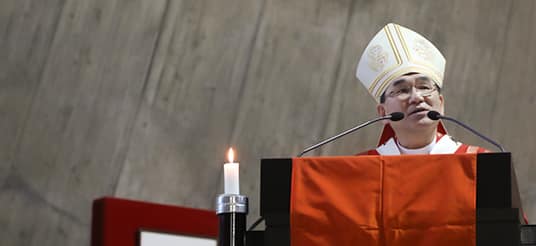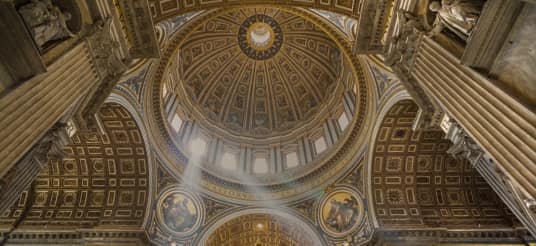Archdiocese of Tokyo

Sermon for Trinity Sunday and Confirmation
3rd June 2012, Matsubara Church
First Reading: Deuteronomy 4:32-34, 39-40
Second Reading: Romans 8:14-17
Gospel: Matthew 28:16-20 (Quotation from the Gospel follows bellow.)
The eleven disciples went to Galilee, to the mountain to which Jesus had ordered them. When they saw him, they worshiped, but they doubted. Then Jesus approached and said to them, “All power in heaven and on earth has been given to me. Go, therefore, and make disciples of all nations, baptizing them in the name of the Father, and of the Son, and of the Holy Spirit, teaching them to observe all that I have commanded you. And behold, I am with you always, until the end of the age.
Today’s Gospel is the final part of St. Matthew’s Gospel. The eleven disciples met Jesus on a mountain in Galilee after His resurrection. It is stated: “but they doubted”. Does this mean that some of the disciples believed, while others doubted? Or does it mean that they were all half in doubt?
The resurrection of Jesus was not readily accepted; not even by the disciples. St. John’s Gospel tells us how Thomas did not believe in the revelation regarding the resurrection of Jesus. It was only after receiving the gift of the Holy Spirit at Pentecost that the disciples came to believe firmly in the resurrection of Jesus. It was the gift of the Holy Spirit that made it possible for them to believe.
Jesus commanded the disciples with the following words: “Go, therefore, and make disciples of all nations”. Jesus commanded us to make disciples of all the peoples of the Earth. Therefore, we recognize it as an essential duty of the Church in Japan to continue this work.
Making disciples means, “baptizing them in the name of the Father, and of the Son, and of the Holy Spirit, teaching them to observe all that I have commanded you.” Baptizing someone means giving that person a new gift of grace, through which the old self dies and the new self rises to everlasting life. It also means bestowing on the new person the life of the Holy Trinity: Father, Son and Holy Spirit.
If we summarize what Jesus ordered us to do, it amounts to the following commandment of love: “Love one another as I have loved you”.
Jesus also said, “I am with you always, until the end of the age.” We might ask, “In what way will Jesus be with us until the end of the age?” When the words of Jesus are spoken, Jesus is with us. When two or three people gather to pray in the name of Jesus, Jesus is with us. When we celebrate Mass, Jesus is with us. The resurrected Jesus is present in Holy Communion. Jesus exists within one who is poor, one who suffers, one who has no place in this world. Jesus is to be found in the “smallest person”.
We, the Church, are indeed the sign that proves the resurrection of Jesus. We must become an even brighter sign of his presence, a shining beacon to guide all peoples throughout the world. We should endeavor to be such a Church, that when people see us, they can believe that Jesus has really been resurrected, and is with the people of the Church.
I recall the following words by Pope Paul VI. “Our Lord has left us to be at the side of the Father in heaven, but the Church remains here on earth as the everlasting sign of his presence in our midst. It is a sign that is sometimes dim, but one that sometimes also burns brightly. It is only in doing so that we can say we are fulfilling our duties, and responding to our calling as missionaries of Jesus Christ.” (Pope Paul VI, Evangelii Nuntiandi (Evangelization), Chapter 15)
We celebrated Pentecost last week and remembered that Jesus remains at our side by sending us the Holy Spirit, which is His own Spirit. As you are aware, Pope Benedict XVI declared a Year of Faith, which begins on the11th of October, 2012. Let us pray that with the light of the Holy Spirit to guide us, we can carry out our mission and faithfully accomplish all that God wills on earth just as He does in heaven.





